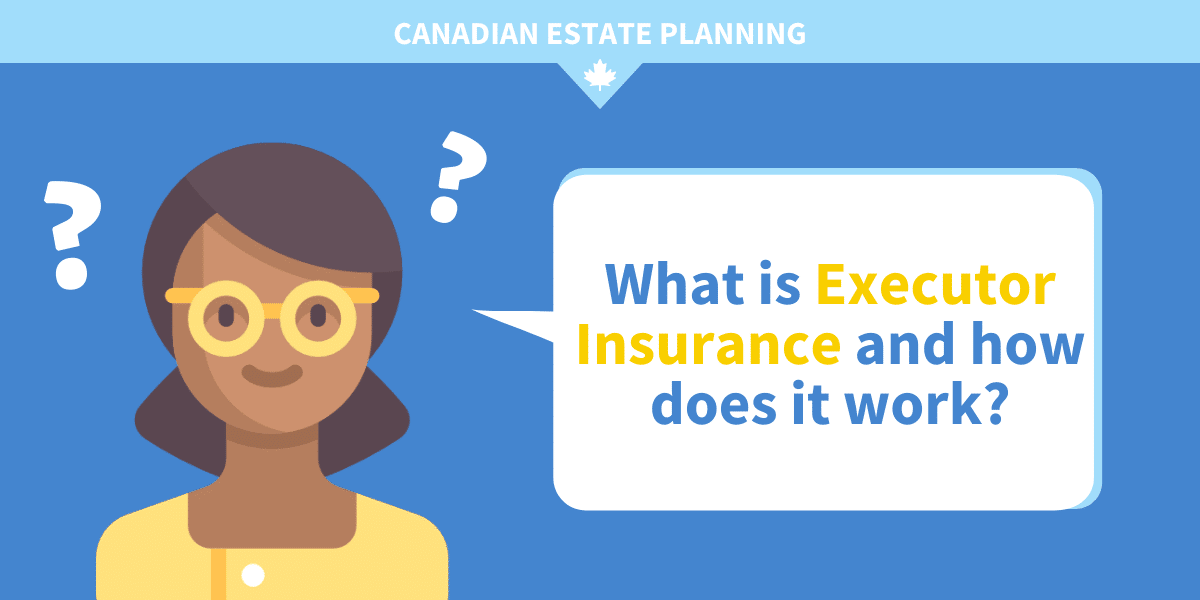
Being the Executor of a Will is a very important job, and one that most Canadians will have to take on at some point in their lives (whether they like it or not.)
As the Executor, you may know that you’re responsible for closing the estate and tasks like arranging the funeral and selling the family home.
What you may not know is that as the Executor, you’re also financially and legally responsible for the estate. That means that if anyone has a problem with the way you’ve handled the estate funds and assets, you could be sued.
So just what is Executor Liability Insurance? It’s the protection between you and the risks that come with your role.
How does Executor Insurance work?
Executor Liability Insurance protects the Executor(s) while they are doing their estate administration duties, such as selling the family cottage, repaying creditors, settling bills and accounts, and cataloguing all possessions for bequeathal.
It’s unfortunately common for a third-party to be disgruntled by the work of the Executor, and end up involving them in an estate litigation battle. We see this most often from beneficiaries and creditors who feel they didn’t get their rightful share of the estate.
If this were to happen, the Executor Insurance would cover:
- Defence costs
- Damages to correct the error or to make the estate whole
- Costs awarded against the Insured
- Reasonable expenses
If you did not have Executor Insurance, you would have to pay for your own legal counsel. If you lose the dispute, you’ll also have to repay the amount your mistakes cost the estate – among other things.
“Terry Dooley, a semi-retired accountant from Toronto and the executor of the estate, was defending himself alongside the estate trustee against claims made by a relative of the deceased. The cost of this estate battle totalled a combined $1 million in legal fees and seven years of their lives.”
The Toronto Star, June 2020
How can I get Executor Insurance?
We encourage people to secure Executor Liability Insurance within 30 days of the person’s passing before any problems arise with the estate. It’s a bit like home insurance – you can’t get a policy if the house is already on fire.
All you need to do is:
- Download this application for Executor Liability Insurance
- Fill out the basic estate information
- Email it to our Team at info@erassure.com. Or you can mail it to the following address:
Estate Risk Protection Plan Inc.
30 Duke Street West, Suite 405
Kitchener, ON, N2H 3W5
You’ll hear back within 1 – 3 days whether or not your insurance application is approved. It must be a Canadian estate to qualify.
Then you will be able to select your coverage options, like whether or not you need a 1 year or 3 year policy. (Keep in mind the average Canadian estate takes two years to close.)
Estate Services Plan
You can also secure Executor Liability Insurance ahead of time by asking the testator to add an Estate Services Plan to their will. (The testator is the loved one who has passed away.)
If you have children, siblings, or friends named as the executor of your own will, you should consider adding an Estate Services Plan for their protection, too. (Need more help preparing your own estate plan? We have some simple steps for you.)
Why would I need Executor Insurance?
Why would someone want to sue an Executor? If a beneficiary believes you’ve made a mistake handling their inheritance, for example, they could sue you for the amount the estate lost as a result of your “negligence”.
Executor negligence can come in many forms, but these are the most common reasons for estate litigation provided by our friends at the Canadian Bar Association:
- Improperly interpreting or not properly following the terms of the Will
- Paying the wrong amounts to the wrong parties
- Improper disbursements for funeral and creditor claims
- Improperly preferring one creditor over another
- Omitting an heir
- Not prudently investing the estate assets
- Breach of the even hand rule (more on this below)
- Self-dealing
- Delay in payment to beneficiaries (this is a common complaint)
- Not properly protecting estate assets, for example not changing locks or purchasing fire insurance or keeping a property in repair
- Not selling assets in a timely way
- Improvident sales of assets
- Failing to invest excess cash
- Unreasonably prosecuting or defending litigation on behalf of the Estate
- Not prosecuting a claim against a 3rd party in time
- Improper delegation of duties
- Improvident settlements
- Failure to keep accurate records of the administration
As you can see, there are many reasons a third-party might disagree with the way an Executor has managed the estate. That’s why it’s crucial to not only protect yourself with Executor Insurance, but also by taking extensive records of all communications, transactions, and decisions related to the estate administration.
What is the even hand rule?
The even hand rule refers to the Executors obligation to treat all beneficiaries equally throughout the estate administration process and in accordance with the will.
Bad blood between beneficiaries is a common cause of disputes. The last thing you want as the Executor is to “take sides” in a difficult family dynamic.
We recommend communicating with all beneficiaries often regarding major decisions, financial changes or expenses, and the timeline on which they will receive their inheritance to reduce the risk of litigation. (Need more help with your Executor role? You can use the free Executor Guide for Canadians any time.)
“In the common event where the testator favours certain beneficiaries more than others, the trustee (aka executor) must still ensure that the manner in which she administers the estate does not favour or burden any beneficiary in a way not prescribed by the will.”
WEL Partners, November 2015
Free Estate Planning Resources
Our free estate planning resources are available to Canadians who need a hand with each step of the estate planning journey, from will preparation to executorship:
- The Official Executor Guide for Canadians
- The Executor Preparation Course
- Free Estate Assessment and Checklist
- How to Prepare Your Estate for Your Executor
- Cottage Co-Ownership Checklist
Still have questions about being an Executor?
Who should I choose to be my executor?
Can there be more than one executor of a will?
How can I protect my family and assets?
What is Executor Liability Insurance?
How can I prepare my child to be the executor of my estate?
Is there a preparation course for future executors?
How to Manage Cottage Co-Ownership
Is there a guide for executors?
What are my tasks as an executor?
Can I include my pet in my will?

